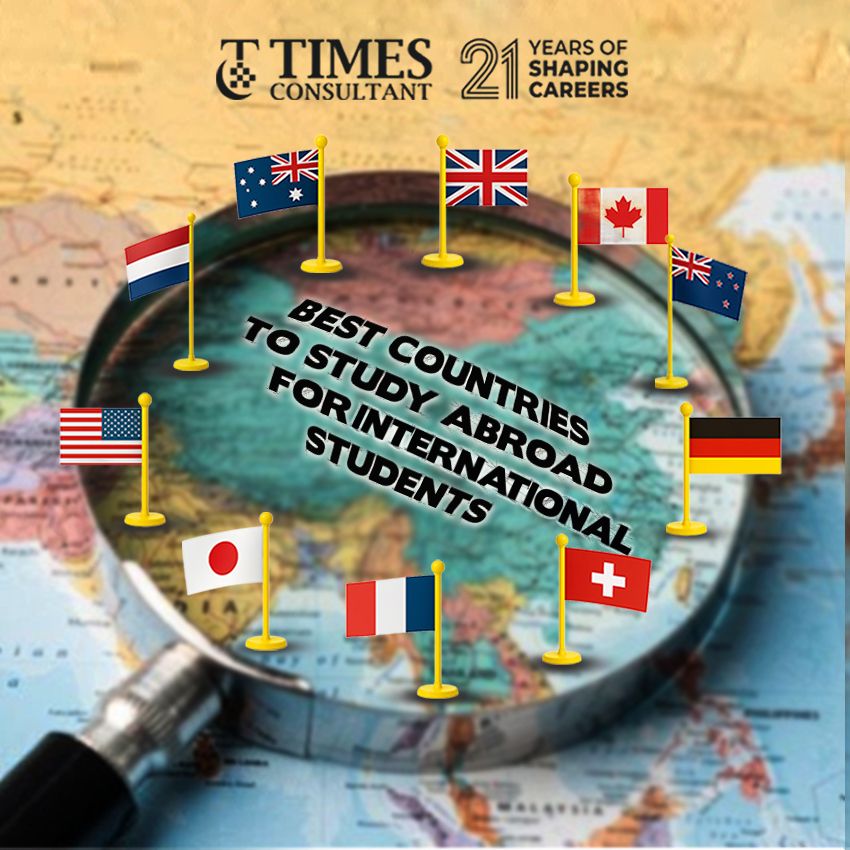

Best Countries to Study Abroad
If there has to be a decision that can offer an exact balance of pure excitement and pure overwhelm, it has to be choosing your study abroad destination. Where do you even begin when there are so many amazing countries to explore? On what basis should you select a country, why they're so great, and what you need to know to make the most of it? We understand that you have a lot of questions, but after reading this guide on the best country to study abroad for international students, you won't have any.
Here's a rundown of the top ten best countries to study abroad, based on their education systems, affordability, cultural vibe, and overall experience.
1. USA
-
Number of Top 200 Universities (QS 2025): 28
-
QS University ranking: MIT 1st, Harvard 4th
The US is a top pick for students as the best country to study abroad. You get endless courses and university options from Ivy League schools, such as Harvard, Stanford, and MIT, to state universities. The US is known for its flexibility, allowing you to explore different subjects before committing to a major, which is great if you're still figuring things out.
Why Choose the USA?
-
Top-ranked Universities: Stanford, MIT, and Yale are some of the best universities in the world for research and innovation.
-
Cultural Diversity: You will meet people from many different countries, which provides a rich cultural experience.
-
Job Opportunities: The US has a large job market, and many programs offer internships or co-op experiences to help you get started in your career.
Heads-up:
- Tuition can take a significant toll on your wallet, especially at private schools. But scholarships and financial aid are out there to support your expenses.
- Living costs vary depending on your location. Big cities like NYC or LA are very pricey. But small college towns are way more affordable.
- Applying to the USA requires a bunch of paperwork-SATs, ACTs, GRE, and the list goes on.
2. United Kingdom
-
Number of Top 200 Universities (QS 2025): 17
-
QS University ranking: Oxford University 2nd, Cambridge University 3rd
The UK is in par with the USA as a top study abroad destination. Oxford, Cambridge, and other UK institutions let you experience historic charm with modern academic practices. Programs in the UK tend to be shorter than in many other countries. Most bachelor's degrees can be completed in three years, while master's programs typically take one to two years. This can lead to significant savings in both time and money.
Why choose the UK:
-
Globally recognized degrees: Universities in the UK are well-known for their rigorous academic standards and research excellence.
-
Cultural immersion: From London's vibrant arts scene to the rolling hills of Scotland, there's so much to explore.
-
Language advantage: If English is your first language (or you're fluent), you won't have to worry about a language barrier.
Heads-up:
- Tuition for international students isn't cheap, but shorter programs help offset the cost.
- The weather is rainy, quite a bit, actually. Be sure to pack a sturdy jacket and prepare for the rain.
- Grading can be intense, with a significant emphasis on exams rather than assignments.
3. Canada
-
Number of Top 200 Universities (QS 2025): 7
-
QS University ranking: Toronto University 25, McGill University 38
Canada is known for its welcoming atmosphere, high-quality education, and beautiful landscapes. Universities like the University of Toronto and UBC are world-class, and the country's commitment to inclusivity makes it a great place to feel at home.
Why Choose Canada?
-
Affordable: Tuition fee in Canada is lower than in the US or UK, especially for international students.
-
Safe and Relaxed: Canada has a reputation for being remarkably safe and laid-back, which is ideal if you want to focus on studying.
-
Natural Beauty: From the Rockies to the Northern Lights, Canada's scenery is breathtaking, making it perfect for weekend hiking or skiing trips.
Heads-up:
- Winters are cold. Like, bundle up or freeze cold, especially in places like Montreal or Edmonton.
- Some cities, such as Vancouver or Toronto, can be expensive to live in, so budget wisely.
- The application process is straightforward; however, you'll need to plan for obtaining visas and permits.
4. Australia
-
Number of Top 200 Universities (QS 2025): 9
-
QS University ranking: Melbourne university 13th , Sydney University 19th
Australia is an ideal choice for those seeking a high-quality education alongside a relaxed lifestyle. Universities such as the University of Melbourne, Sydney, and Queensland are globally recognized, particularly in the fields of environmental science and business. The education system emphasizes practical skills and industry connections.
Why choose Australia?
-
Excellent institutions: Australian universities are renowned for their research and innovation, particularly in fields such as marine biology and environmental science.
-
Lifestyle goals: Beaches, barbecues, and a relaxed vibe make studying here feel like a vacation sometimes.
-
Work options: International students can work part-time, which helps with living costs and provides valuable real-world experience.
Heads-up:
- It's far from many places so that flights home can be expensive and long.
- Tuition and living costs can be high, especially in cities like Sydney or Melbourne.
- The wildlife is intense. Spiders and snakes are no joke, so maybe don't go poking around in the bush.
5. Germany
-
Number of Top 200 Universities (QS 2025): 6
-
QS University ranking: TU Munich 28th , Heidelberg 59th
Germany's a hidden gem when it comes to the best countries to study abroad. It's got top-tier universities, low (or even free) tuition for international students, and a culture that's both modern and steeped in history. What else would one want if you are getting high-quality, low-cost education in one place?
Why choose Germany?
-
Free or cheap tuition: Germany is one of the most affordable countries to study abroad. Public universities charge little to no tuition, even for international students.
-
Strong economy: Germany is a powerhouse, so studying here can open doors to great job opportunities, especially in engineering and technology.
-
Cultural mix: From Berlin's artsy vibe to Bavaria's Oktoberfest, there's always something going on.
Heads-up:
- You'll need to learn some German, especially for undergraduate programs, although many master's programs are taught in English.
- The bureaucracy (think visas and paperwork) can be time-consuming, so start early.
- The culture can feel somewhat formal at first, but once you settle in, it's incredibly welcoming.
6. New Zealand
-
Number of Top 200 Universities (QS 2025): 2
-
QS University ranking: University of Auckland 68th, Otago university 176th
New Zealand's a small country with a significant impact. Universities like Auckland and Otago excel in fields such as environmental science, and the stunning scenery is a welcome bonus.The country has 8 universities, all ranked among the top 3% worldwide.
Why Choose New Zealand?
-
Quality education: Globally recognized universities with small class sizes and a hands-on learning approach.
-
Natural beauty: You'll get to live around fjords, forests, and beaches in New Zealand.
-
Friendly vibe: Kiwis are a welcoming community, making it easy for international students to settle in.
Heads-up:
- Tuition costs range from NZD 22,000 to NZD 40,000 ($13,000 to $24,000) per year, and living expenses can be high in Auckland.
- It's remote, so flights home are expensive.
- Fewer program options compared to larger countries.
7. France
-
Number of Top 200 Universities (QS 2025): 4
-
QS University ranking: Paris Sciences et Lettres 38th
France is a cultural hub, with iconic landmarks, museums, and a vibrant arts scene, allowing you to experience its centuries-old rich history, language, and lifestyle. Universities like the Sorbonne, in Paris and Lyon, excel in the arts and humanities, making France one of the best countries to study abroad
Why Choose France?
-
Affordable fees: Public universities charge €170-€4,000 per year, making them accessible to international students.
-
Cultural immersion: Museums, cafes, and festivals create a vibrant student experience.
-
Career opportunities: A two-year post-study visa for master's graduates aids job searches.
Heads-up:
- Learning French helps with part-time work, though English-taught programs are available.
- Living costs in Paris, ranging from around €7,000 to € 10,000 ($7,800-$11,000) per year, require careful budgeting.
- Administrative processes can be complex and time-consuming.
8. Japan
-
Number of Top 200 Universities (QS 2025): 5
-
QS University ranking: University of Tokyo 29th, Kyoto University 49th
Japan is a hot favorite study destination not just because of its innovative projects and top-rated universities, but also because it's set against an amazing backdrop of temples and modern cities. Japan has some of the best universities and research institutions in the world. Safety, high quality of life, and affordable fees are added advantages.
Why Choose Japan?
-
Innovative education: Programs in robotics and engineering are globally respected.
-
Cultural depth: Experience tea ceremonies, festivals, and urban life in Tokyo or Kyoto.
-
Student support: Scholarships and accessible visas ease the transition for internationals.
Heads-up:
- The language barrier can be challenging but Japanese skills are helpful for working.
- Tuition is ¥535,800-1,500,000 ($3,600-$10,000) yearly, with high living costs in cities.
- Academic demands are rigorous, requiring strong dedication.
9. Netherlands
-
Number of Top 200 Universities (QS 2025): 6
-
QS University ranking: Delft University 47th , University of Amsterdam 53
Dutch institutions are known for their strengths in engineering, technology, sustainable development, and international business, while maintaining high academic standards across all disciplines. The Netherlands has a flexible educational structure, allowing you to pursue your educational goals with freedom. Their progressive and sustainable approach to life ensures a healthy environment for residents.
Why choose the Netherlands?
-
No language barrier: Extensive English-taught programs across all levels
-
Practical learning: Strong focus on practical and innovative teaching methods
-
Quality of life: Excellent quality of life with efficient public infrastructure
Heads-up:
- Housing can be challenging to secure in major cities
- You will need to plan well in advance for accommodation
- The admission criteria are competitive for popular programs
10. Switzerland
-
Number of Top 200 Universities (QS 2025): 2
-
QS University ranking: ETH Zurich 5th, Zurich University 78th
Switzerland is undoubtedly one of the most beautiful places on Earth, and what adds to its beauty is that it's also among the top 10 best countries to study abroad. Swiss degrees are highly recognized worldwide, with 85% of graduates finding employment within six months of graduation. You'll also benefit from the country's central location in Europe and its affordable tuition fees.
Why Choose Switzerland?
-
Top ranked universities: ETH Zurich is ranked among the world's best.
-
Multicultural environment: Four official languages In Switzerland are spoken.
-
Career connections: Strong ties to finance and tech industries enhance job prospects.
Heads-up:
- Living costs are high, ranging from $12,000 to $ 15,000 per year, plus $350 per month for health insurance.
- Tuition is low (CHF 1,000-8,000 or $1,000-$8,000), but budgeting is essential.
- Academic programs are highly competitive, requiring a focused and diligent effort.

Best countries to study abroad for Pakistani students
| Country | Tuition (USD/year) | Living Costs (USD/year) | Post-Study Work Visa | Academic Quality (Key Strengths) |
|---|---|---|---|---|
| United States | 20,000-50,000 | 10,000-20,000 | 1 year (OPT) | Top ranked universities like Harvard, MIT.<br>Endless academic choices<br>Extensive networking opportunities |
| United Kingdom | 13,000-50,000 | 12,000-22,000 | 2 years (Graduate Route) | Prestigious institutions like Oxford, Cambridge<br>Strong career prospects<br>Historic and Modern Experiences |
| Canada | 11,000-30,000 | 8,000-15,000 | Up to 3 years | Innovative and practical learning<br>Co-op and work-integrated learning programs<br>Post-graduation work permit (PGWP) |
| Australia | 13,000-30,000 | 14,000-19,000 | 2-4 years | Global research opportunities<br>Post-study work rights<br>Regional study benefits |
| Germany | 0-1,800 | 10,000-15,000 | 18 months | No or low tuition fees at public universities<br>Top IT and Tech programs<br>Strong economy and job opportunities |
| New Zealand | 13,000-24,000 | 12,000-18,000 | Up to 3 years | Practical and industry-focused programs<br>Personalized education<br>Affordable tuition fees |
| France | 200-4,700 | 7,800-11,000 | 2 years (Master’s) | Dual education structure<br>Research excellence<br>Professional integration |
| Japan | 3,600-10,000 | 10,000-15,000 | 1 year (job search) | World-class universities<br>Research opportunities<br>Scholarships and financial support |
| Netherlands | 6,700-16,700 | 10,000-15,000 | 1 year | Research-driven learning<br>Growing job market<br>Global student community |
| Switzerland | 1,000-8,000 | 12,000-15,000 | 6 months | Multilingual education<br>Practical learning<br>Strong industry connections |
Choosing the Right Country for You
Selecting the best countries to go study abroad depends on your priorities and circumstances. Consider these questions:
- What’s your budget? Germany and Canada offer more affordable options than the U.S. or U.K.
- What’s your field of study? The U.S. and Germany are strong in STEM, while the U.K. excels in humanities.
- What lifestyle suits you? Australia and New Zealand offer outdoor adventures, while the U.K. and Canada provide vibrant urban experiences.
- Do you want to stay after graduation? Countries like Canada and Australia offer generous post-study work visas.
Final Thoughts
Studying abroad is not just about getting a degree, it’s about growing as a person. You’ll learn to navigate new environments, make friends from all over the world, and maybe even pick up a new language. Plus, it looks amazing on your resume. Employers love seeing that you’ve stepped out of your comfort zone and adapted to a new culture.
So take your time but make the decision after considering all the questions we have shared. At Times Consultant, we’ve guided thousands of students in choosing the right course, university, and country to match their aspirations. From application support to visa processing and settlement guidance, we’re here to make your study abroad journey seamless.
Book an online consultation today to get expert guidance tailored to your academic and career ambitions.
Recent Blogs
Talk to a Study Abroad Expert
Get personalised guidance from Times Consultant within 24 hours.
Tags
- Best Countries to Study Abroad
Recent Blogs
Tags
- Best Countries to Study Abroad

